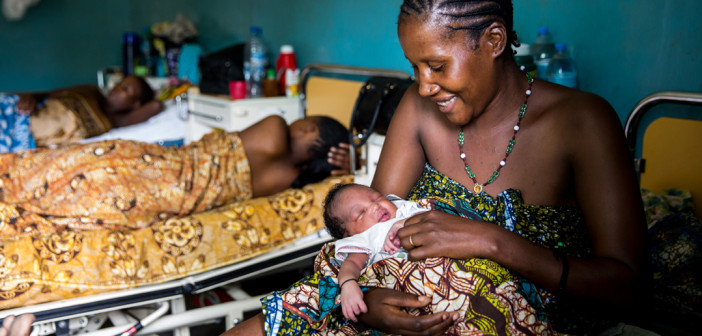Pioneering new ‘ambulance taxi’ service could help save at least 2,700 lives of pregnant mothers and babies in rural Tanzania each year
Women in Tanzania, Africa, are now able to use a network of taxis as emergency transportation to hospital, thanks to an initiative using Vodafone’s M-Pesa.
Many hundreds of high risk pregnant women in an area of Tanzania around the size of Belgium are not surviving pregnancy or are losing their babies as there is no means of getting them to hospital.
In response, a pioneering new toll-free emergency line has been launched by the Vodafone Foundation, alongside its NGO partners Pathfinder International and Touch Foundation and the US Agency for International Development (USAID).
The emergency line – equivalent to 112 in Europe, 911 in the US and 999 in the UK – could help save around 225 women’s and babies’ lives a month, and will see a network of 100 taxi drivers responding to emergency calls, taking pregnant women on what is often a three hour journey to reach the nearest hospital.
Once women arrive at hospital, the emergency taxi drivers are paid using Vodafone’s mobile payment service M-Pesa. A trial of the taxi service late last year in an area of Sengerema saved the lives of 323 women and babies.
Previously, there was no way for many pregnant women with serious complications, many of who are teenagers, to get to hospital in the districts of Sengerema and Shinyanga. Despite a population of two million people, only 10 ambulances service the expansive area, leading to large numbers of maternal and infant deaths.
As part of the wider programme, a network of 250 community health workers in Sengerema and Shinyanga have been taught Tanzania’s newborn and child health curriculum, and an additional 209 health workers have been trained in life-saving emergency obstetric and newborn care. Touch Foundation helped improve facilities in hospitals, including building two theatres for Caesarean sections.
A mobile application has also been developed for the community health workers, which lists more than 10,000 pregnant women and identifies those who are high risk cases.
Pathfinder International, whose role in the partnership involved working with community health workers and health centres, has separately worked with WeCareSolar to install solar suitcases in 58 facilities for provision of power, making night deliveries possible.
The Vodafone Foundation has been supporting maternal health in Tanzania since 2010. As part of the Vodafone Foundation’s Connecting for Good programme, Vodafone partnered with the Comprehensive Community Based Rehabilitation Tanzania (CCBRT) and various NGOs to help cure women who suffer from obstetric fistula. Thanks to the partnership and the use of M-Pesa, (CCBRT uses M-Pesa to transfer funds for a patient’s travel to hospital) hundreds of women are now receiving the treatment they desperately need.
The total number of surgeries increased from 268 in 2010 when M-Pesa was first introduced into the patient referral process, to more than 3,000 in 2016, making it the largest fistula repair programme in the world. The maternal health programme in Tanzania is part-funded by USAID and the Swiss Re Foundation.
Vodafone Foundation director, Andrew Dunnett, said: “Our maternal health programme is another example of the transformative power of technology. Since 2010, our ‘text to treatment’ programme has benefitted more than 3,000 women living with debilitating maternal condition obstetric fistula. Now, this pioneering new service will provide a much-needed lifeline for thousands of high risk pregnant women in Tanzania without access to emergency healthcare.”
Pathfinder International president and CEO, Purnima Mane, added: “Our work in Tanzania is a true testament to our efforts to create better health outcomes for women worldwide. Through our partnership with Vodafone, we have been able to reach pregnant women with behaviour change interventions and appointment reminders, as well as provide health facilities with everything from trainings and services to solar lighting. As a result, we have reached more than 15,000 women and have seen a 53% increase year over year in facility-based deliveries. We are looking forward to this next component of our programme and the support it will provide to pregnant women in Tanzania, especially those deemed high risk.”
USAID Tanzania acting h ealth officer, director Bethany Haberer, nopted: “We can all be proud of the progress that is in evidence today, yet much work remains to be done. Having achieved remarkable healthcare results in Sengerema, we need to consider the elements of this programme that can be replicated, taken to scale, and sustained, all with increased support from the Government of Tanzania.”





